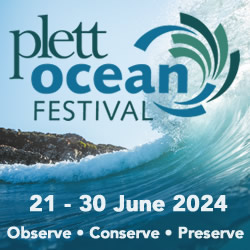

The turtles that wash up on beaches across the country are hatchlings from KwaZulu-Natal, the nearest breeding area, that become caught in strong currents.
The first loggerhead turtle hatchling of the season has washed up on one of Plettenberg Bay’s beaches, leaving conservationists concerned.
Every year between April and May large numbers of endangered loggerhead turtle hatchlings wash up on beaches across the country, including the Garden Route.
The turtles are hatchlings from KwaZulu-Natal, the nearest breeding area, that become caught in strong currents.
They usually swim into the warm Agulhas currents and drift southwards, but often a strong southeasterly wind and rough sea conditions force them into colder Cape waters. They end up beaching along the coastline to escape the cold.
Steven Hendriks from the Tenikwa Wildlife Rehabilitation and Awareness Centre said that this year the first hatchling was found relatively early.
He explained that on March 10, a very small turtle – weighing only 28.25g – was found near the Beacon Island Hotel on Plettenberg Bay’s Central beach.
When the little sea creature, which was discovered by a beachgoer, arrived at the centre it was not active and could barely lift its head. It also had injuries – missing sections – on both front flippers.
Brought back to health

The little hatchling was found on Plettenberg Bay’s Central beach on March 10, relatively early as these beaching usually occur between April and May. Photos: Supplied.
“It was immediately placed in Darrow’s solution [a hydration solution] for about 30 minutes. This process was repeated over the next few days. Four days later the turtle was strong enough to swim around. It was also around this time that it started eating twice a day.”
Hendriks explained that sea turtles spend their entire lives at sea and only females beach when laying eggs. This is something that does not happen in local waters.
“So if you spot a turtle on the beach, it needs help,” Hendriks said.
Hendriks said often the turtles arrive at Tenikwa very dehydrated and therefore staff soak them in the hydration solution and place them in an enclosure simulating their natural habitat.
Once they are strong enough the turtles are flown on a CemAir-sponsored flight to Cape Town where they are sent to the Two Oceans Aquarium to be further rehabilitated and eventually released into the wild.
Every year the aquarium receives about 10 to 20 of these tiny turtles, but over the last two years between 100 and 200 beached due to extreme weather conditions.
How to handle hatchlings
Hendriks warned beachgoers not only to be on the lookout for turtles in trouble, but said that there is a very specific way of handling the hatchlings.
- He said the first step is to place it in a dry container as throwing it back into the ocean would mean certain death because they are often too weak to come up for air and would therefore drown.
- He added that it is also important to keep the turtle at room temperature to warm up slowly. These turtles are in most cases suffering from hypothermia, which makes them weak. In severe cases they look dead, but you can softly pull on one of the flippers to check if there is any movement. Beachgoers should not presume that the animal is dead, he said.
- Hendriks also warned not to feed or give the turtles water.
- Once a turtle is found, contact Tenikwa or the nearest CapeNature, SANParks or animal rehabilitation centre.
* Tenikwa can be contacted on 082-486-1515 or 044-534-8170.













